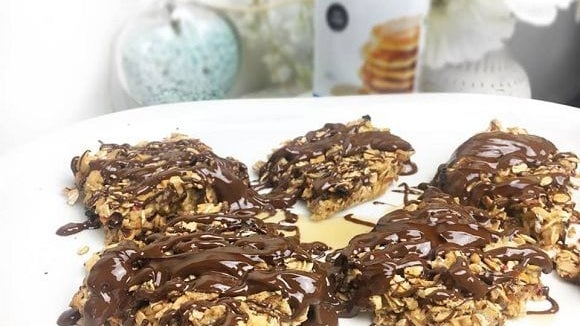
Cortisol – 7 Möglichkeiten, um den katabolen Feind zu minimieren
- Corstisol: Die Fakten
- Cortisol: Die Aufgaben im Körper
- 7 Maßnahmen gegen einen erhöhten Cortisolspiegel
- Cortisol | Zusammenfassung
Corstisol: Die Fakten

Cortisol ist ein Steroidhormon und gehört zu den Glukokortikoiden (Hormone, die den Zuckerstoffwechsel beeinflussen). Es wird besonders in Stresssituationen (dazu zählt natürlich auch eine anstrengende Trainingseinheit) ausgeschüttet und aktiviert katabole (=energiefreisetzende) Stoffwechselvorgänge. Daher kommt die Angst vieler Bodybuilder vor diesem Hormon, aber dazu später mehr.
Die Synthese findet in der Nebennierenrinde statt, welche durch die Ausschüttung des sogenannten adrenocorticotropen Hormons (ACTH) aus dem Hypophysenvorderlappen aktiviert wird (1). Neben der Ausschüttung in Stresssituationen wird Cortisol täglich in natürlichen Zyklen produziert: In der Nacht sinkt der Cortisolspiegel stark ab, im Morgen kommt es zu einem starken Anstieg (2).
Cortisol: Die Aufgaben im Körper

7 Maßnahmen gegen einen erhöhten Cortisolspiegel

Maßnahme 1: Vermeide Stress

Maßnahme 2: Trainiere 45-60 Minuten
Maßnahme 3: Kohlenhydrate pre-, intra- und post-Workout

Maßnahme 4: Schlafe mindestens 8-9 Stunden
Maßnahme 5: Meide Koffein
Maßnahme 6: Nimm genügend Vitamin C zu dir

Maßnahme 7: Supplementiere Phosphatidylserin (PS)
Cortisol | Zusammenfassung


[1] Hart I, Newton RW: Endocrinology. Lancester: MTP Press Limited, 1983, 2. Auflage.
[2] Born, J., et al. (1986): Night time plasma cortisol secretion is associated with specific sleep stages. In: Biol Psychiatry. URL: http://www.ncbi.nlm.nih.gov/pubmed/3790626.
[3] Hein, L. / Lüllmann, H. / Mohr, L. (2006): Pharmakologie und Toxikologie. Stuttgart: Georg Thieme Verlag KG, 2006, 16. Auflage.
[4] Field, T., et al. (2015): Cortisol decreases and serotonin and dopamine increase following massage therapy. In: Int J Neurosci. URL: http://www.ncbi.nlm.nih.gov/pubmed/16162447.
[5] Chrousos, G., et al. (2005) Exercise and the Stress System. In: Hormones. URL: http://hormones.gr/preview.php?c_id=57.
[6] Robson, PJ., et al. (1999): Effects of exercise intensity, duration and recovery on in vitro neutrophil function in male athletes. In: Int J Sports Med. URL: http://www.ncbi.nlm.nih.gov/pubmed/10190775.
[7] Birdm SP. / Tarpenning, KM. / Marino, FE. (2006): Effects of liquid carbohydrate/essential amino acid ingestion on acute hormonal response during a single bout of resistance exercise in untrained men. In: Nutrition. URL: http://www.ncbi.nlm.nih.gov/pubmed/16472979.
[8] Bird, SP. / Tarpenning, KM. / Marino, FE. (2006): Independent and combined effects of liquid carbohydrate/essential amino acid ingestion on hormonal and muscular adaptations following resistance training in untrained men. In: Eur J Appl Physiol. URL: http://www.ncbi.nlm.nih.gov/pubmed/16456674.
[9] Weitzman, ED., et al. (1983): Cortisol secretion is inhibited during sleep in normal man. In: J Clin Endocrinol Metab. URL: http://www.ncbi.nlm.nih.gov/pubmed/6822642.
[10] Follenius M1, Brandenberger G, Bandesapt JJ, Libert JP, Ehrhart J: Nocturnal cortisol release in relation to sleep structure. Sleep. 1992 Feb;15(1):21-7: http://www.ncbi.nlm.nih.gov/pubmed/1557591.
[11] Leproult, R., et al. (1997): Sleep loss results in an elevation of cortisol levels the next evening. In: Sleep. URL: http://www.ncbi.nlm.nih.gov/pubmed/9415946.
[12] Farag, N., et al. (2006): Cortisol responses to mental stress, exercise, and meals following caffeine intake in men and women. In: Pharmacol Biochem Behav. URL: https://www.ncbi.nlm.nih.gov/pmc/articles/PMC2249754.
[13] Nakhostin-Roohi, B., et al. (2008): Effect of vitamin C supplementation on lipid peroxidation, muscle damage and inflammation after 30-min exercise at 75% VO2max. In: J Sports Med Phys Fitness. URL: http://www.ncbi.nlm.nih.gov/pubmed/18427418.
[14] Jäger, R., et al. (2008): The effects of phosphatidylserine on endocrine response to moderate intensity exercise. In: J Int Soc Sports Nutr. URL: https://www.ncbi.nlm.nih.gov/pmc/articles/PMC2503954/.
[15] Hellhammer, J., et al. (2004): Effects of soy lecithin phosphatidic acid and phosphatidylserine complex (PAS) on the endocrine and psychological responses to mental stress. In: Stress. URL: http://www.ncbi.nlm.nih.gov/pubmed/15512856.
[16] Monteleone, P., et al. (1992): Blunting by chronic phosphatidylserine administration of the stress-induced activation of the hypothalamo-pituitary-adrenal axis in healthy men. In: Eur J Clin Pharmacol. URL: http://www.ncbi.nlm.nih.gov/pubmed/1325348.








